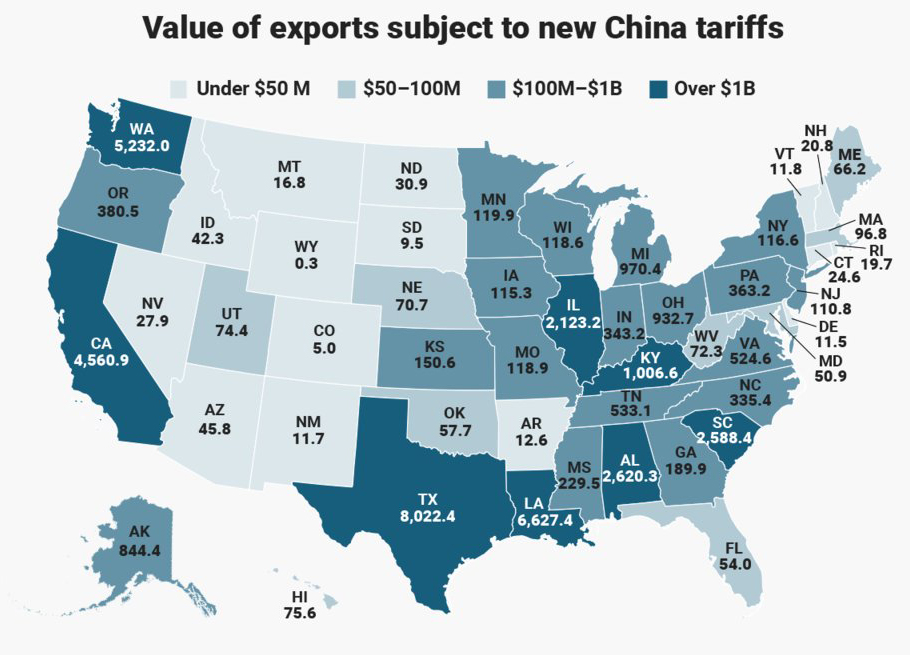By Morf Morford
Tacoma Daily Index
Tom Pierson, President & CEO, Tacoma-Pierce County Chamber, describes Pierce County as the most trade dependent county of the most trade dependent state in the country.
According to a recent survey, 40% of workers in Washington have some relation to international trade.
To put it mildly, everything that happens in almost any corner of the world has its impact here. With JBLM as Pierce County’s primary employer and the Port of Tacoma not far behind, it doesn’t take a degree in business to realize that every natural disaster, war or shift in economic policy has an eventual, if not immediate, public if not personal effect.
You also don’t need a business degree to know that tariffs create trade wars, if not depressions. And trade wars, perhaps like all wars, have few, if any, real winners. But they do have plenty of losers.
The state of Washington, particularly the Puget Sound region, has one of the nation’s historically healthiest economies precisely because of this “dependence” on trade.
TARIFF, n. A scale of taxes on imports, designed to protect the domestic producer against the greed of his consumer. – Ambrose Bierce
For those same reasons, we also are among the states with the most to lose in a trade war.
When statesmen bicker, posture and threaten, we lose jobs.
According to the Economic Development Board for Tacoma-Pierce County (EDB) of Pierce County, marine cargo creates more than 48,000 jobs and air cargo (via SeaTac International Airport) creates more than 5,200 jobs.


The Northwest Seaport Alliance (Ports of Tacoma and Seattle) made their case about the immediate and potential risks of tariffs on the economies of the greater Seattle-Tacoma area.
From Boeing to your local hardware store, costs will go up unpredictably.
That is just a few examples, and those impacts from costs to jobs will ripple through our state and local economies.
Tariffs are the ultimate exercise in unintended consequences.
They might seem like a simple solution, but their repercussions will hit us in many unexpected ways.
As I write this, in June of 2018, those of us who follow the stock market have almost become accustomed to triple-digit swings on a daily basis as each industry responds to the ever shifting demands, requirements, exceptions and costs of changes in global trade.
As always, the blunt tool of tariffs hits industries, consumers and even nations unequally.
Two of the most iconic American products, Levi’s jeans and Harley-Davidson (HD) motorcycles have been driven out (and domestic jobs lost) because of tariffs and trade inequities.
Levi’s jeans, founded in San Francisco in 1853 in response to the Gold Rush, currently makes more than 99% of their jeans in countries like China, Japan, Italy, Pakistan or Mexico.
Any time you read that your government is erecting tariff barriers, supporting threatened industries with subsidies, or interfering in any way with free trade between individuals or nations, you must realize that your standard of living is being lowered as a result. – John Pugsley
One line of USA made Levi’s jeans (the 501) is available (sometimes) via their website (https://www.levi.com/US/en_US/clothing/men/jeans/levis-made-in-the-usa-501-original-fit-jeans/p/005011995) (1*)
Harley-Davidson has struggled to keep a footing with Japanese and European competitors. Increasing tariffs are hitting them hard – https://www.theguardian.com/us-news/2018/mar/10/harley-davidson-tariffs-trump-motorcycles.
About 16% of Harley’s sales are to Europe. They sold 40,000 bikes in Europe last year and their revenue generated from the EU is second only to the US.
Thanks to tariffs, HD is moving production (and jobs – and taxes) to Europe (https://www.theguardian.com/business/2018/jun/25/harley-davidson-production-us-eu-tariffs-motorcycles).
China, by some measures, already the world’s largest economy – and if it isn’t, it certainly will be – is not the best adversary in a completely unnecessary trade war.
And Canada, our closest trade partner, is reacting to our trade policies with policies of their own. We in the Puget Sound region will lose jobs and businesses if not entire industries.
Tariffs rarely, if ever, lead to lasting productive economic development. They often lead to spiraling costs and trade deficits if not even more costly military entanglements.
Tariff policy beneficiaries are always visible, but its victims are mostly invisible. Politicians love this. The reason is simple: The beneficiaries know for whom to cast their ballots, and the victims don’t know whom to blame for their calamity. – Walter E. Williams
(1*) For about $70 – almost double the price of the imported versions.








